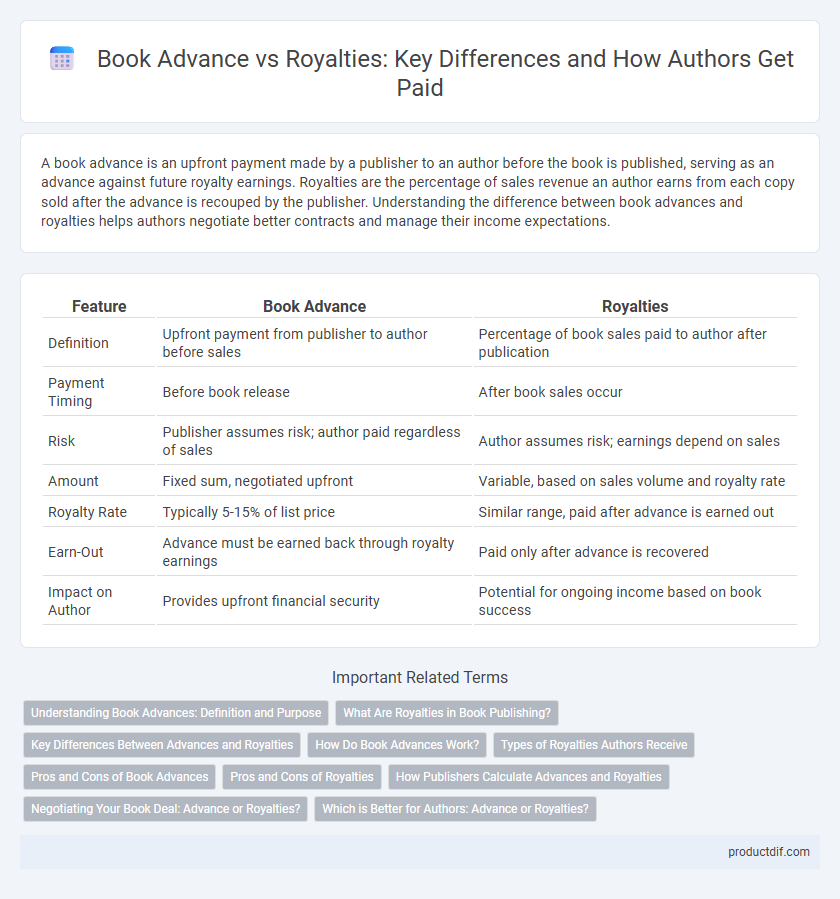A book advance is an upfront payment made by a publisher to an author before the book is published, serving as an advance against future royalty earnings. Royalties are the percentage of sales revenue an author earns from each copy sold after the advance is recouped by the publisher. Understanding the difference between book advances and royalties helps authors negotiate better contracts and manage their income expectations.
Table of Comparison
| Feature | Book Advance | Royalties |
|---|---|---|
| Definition | Upfront payment from publisher to author before sales | Percentage of book sales paid to author after publication |
| Payment Timing | Before book release | After book sales occur |
| Risk | Publisher assumes risk; author paid regardless of sales | Author assumes risk; earnings depend on sales |
| Amount | Fixed sum, negotiated upfront | Variable, based on sales volume and royalty rate |
| Royalty Rate | Typically 5-15% of list price | Similar range, paid after advance is earned out |
| Earn-Out | Advance must be earned back through royalty earnings | Paid only after advance is recovered |
| Impact on Author | Provides upfront financial security | Potential for ongoing income based on book success |
Understanding Book Advances: Definition and Purpose
A book advance is a lump sum payment made by a publisher to an author before the book is published, serving as an upfront guarantee against future royalties. This payment provides financial support for the author during the writing process and indicates the publisher's confidence in the book's commercial potential. Understanding the purpose of book advances helps authors negotiate better contracts and manage their income expectations effectively.
What Are Royalties in Book Publishing?
Royalties in book publishing represent a percentage of the book's sales revenue paid to the author, typically ranging from 5% to 15% of the retail or net price. These payments are calculated after the book is published and sold, serving as ongoing income directly tied to the book's commercial success. Unlike an advance, royalties accrue only after the book has earned back its initial payment to the author.
Key Differences Between Advances and Royalties
Book advances are upfront payments made to authors before publication, serving as an initial financial guarantee. Royalties represent a percentage of sales revenue the author earns after the book is sold, calculated from net or gross sales. The key difference lies in timing and risk: advances are paid regardless of sales performance, while royalties depend entirely on the book's commercial success.
How Do Book Advances Work?
Book advances are upfront payments made by publishers to authors before the book earns any royalties, typically based on anticipated sales and market potential. This payment is recoupable, meaning the author does not receive additional royalty income until the advance amount has been earned back through book sales. Advances vary widely depending on factors such as the author's track record, genre, and publisher size, often ranging from a few hundred to several hundred thousand dollars.
Types of Royalties Authors Receive
Authors typically receive several types of royalties, including print royalties based on the sale of physical books, digital royalties from eBook sales, and audio royalties earned from audiobooks. Performance royalties may also apply when books are adapted for stage, film, or broadcast, generating additional revenue streams. Understanding these various royalty types helps authors maximize their earnings beyond the initial book advance.
Pros and Cons of Book Advances
Book advances provide authors with upfront financial security, allowing them to focus on writing without immediate financial pressure; however, advances can be risky if the book underperforms, as royalties won't be earned until the advance is fully recouped. Advances also offer motivational benefits and prestige but may limit earnings potential if the book becomes a bestseller since royalties are only paid after the advance is earned back. Securing a large advance often depends on an author's track record or the publisher's confidence in market potential, making advances less accessible to new or lesser-known authors.
Pros and Cons of Royalties
Royalties provide a continuous income stream based on actual book sales, aligning author earnings with the book's market success while eliminating upfront financial risk for the publisher. However, royalty payments can be unpredictable and often result in delayed income, which may pose cash flow challenges for authors without substantial initial earnings. The percentage of royalties varies widely, sometimes leading to lower total compensation compared to an upfront advance, especially if sales underperform.
How Publishers Calculate Advances and Royalties
Publishers calculate book advances based on anticipated sales, author reputation, and market potential, often offering a lump sum paid before publication. Royalties are calculated as a percentage of net or gross sales, typically ranging from 5% to 15% of the book's retail price or net revenue. Advances are then earned out as royalties accrue, with future royalty payments issued only after the advance is fully recouped.
Negotiating Your Book Deal: Advance or Royalties?
Negotiating your book deal requires understanding the trade-offs between an advance and royalties, where an advance offers upfront payment based on expected sales while royalties provide ongoing income as copies sell. Authors should analyze factors such as the publisher's track record, estimated sales volume, and personal financial needs to determine which option maximizes long-term earnings. Evaluating contract terms carefully ensures that rights, payment schedules, and royalty rates align with your career goals and revenue expectations.
Which is Better for Authors: Advance or Royalties?
Choosing between a book advance and royalties depends on the author's financial needs and career goals. An advance offers immediate guaranteed income, providing financial security before sales begin, while royalties allow for potential long-term earnings based on book sales performance. Authors prioritizing immediate funds may prefer advances, whereas those confident in strong market demand might benefit more from royalties over time.
Book Advance vs Royalties Infographic

 productdif.com
productdif.com